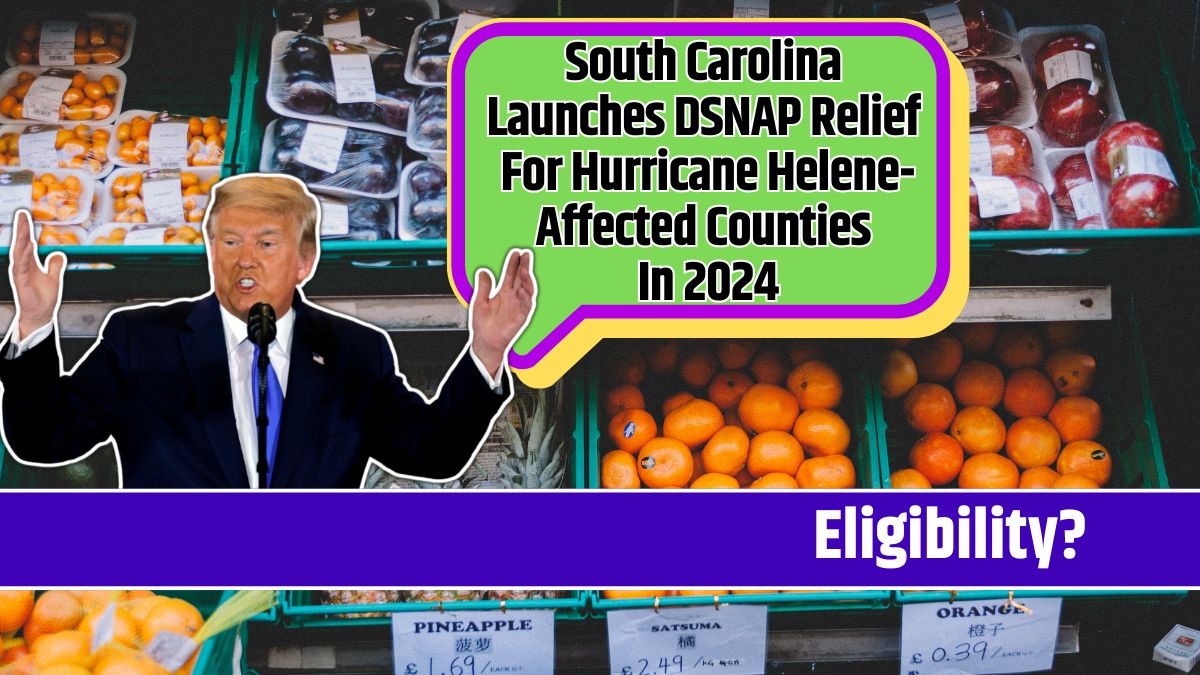South Carolina families affected by Hurricane Helene can now receive special SNAP support, known as DSNAP, to help cover essential food expenses.
Recently announced by the South Carolina Department of Social Services (DSS), this disaster-specific aid will provide quick and efficient assistance to residents in counties hardest hit by the hurricane.
With electronic benefit transfer (EBT) cards, qualifying families can buy groceries at authorized SNAP retailers, a lifeline for those dealing with non-reimbursable damages.
DSNAP
DSNAP, or Disaster Supplemental Nutrition Assistance Program, is a special variation of SNAP designed to provide emergency food aid following natural disasters.
DSNAP benefits are issued through reloadable debit cards specifically for food purchases, offering relief to families facing damaged homes, lost income, or unexpected costs from the disaster.
For South Carolina families impacted by Hurricane Helene, DSNAP provides timely, practical support as they begin the recovery process.
Phase-by-Phase Assistance
To effectively distribute DSNAP, DSS has organized a two-phase rollout, beginning with the most severely affected counties. Eligible residents in each county must pre-register and complete a phone interview to confirm their eligibility.
Counties in the First Phase:
- Aiken
- Allendale
- Anderson
- Bamberg
- Barnwell
- Beaufort
- Cherokee
- Hampton
- Laurens
- McCormick
- Saluda
- Spartanburg
- Union
- York
Residents in these counties, heavily impacted by Hurricane Helene, can access DSNAP assistance if they meet the specific eligibility requirements.
Eligibility for DSNAP
Eligibility for DSNAP is based on residency and disaster-related impacts. Households must have been living in one of the designated counties during the hurricane and must show one or more of the following:
- Damage or destruction of their primary residence
- Lost or restricted access to income due to the hurricane
- Disaster-related expenses unlikely to be reimbursed
While food loss alone does not qualify a household for DSNAP, DSS stresses the need for additional non-reimbursable losses to meet eligibility standards.
Additional Counties Set to Receive Assistance
After the initial phase, more South Carolina counties will become eligible for DSNAP aid. DSS confirmed that the program would expand to other areas in the Midlands region, including:
- Fairfield
- Kershaw
- Lexington
- Newberry
- Orangeburg
- Richland
This phased approach allows DSS to provide focused support to regions needing it most, expanding relief to a larger group of residents as resources become available.
Application Process
The application for DSNAP is streamlined to ensure families receive help as quickly as possible. Eligible households must pre-register and participate in a phone interview to confirm their qualifications.
Approved families will then receive a DSNAP debit card with funds designated for food purchases at SNAP-authorized stores.
Steps to Apply:
- Pre-register online: Sign up and submit basic information.
- Phone interview: Complete a telephone interview with a DSS representative to verify eligibility.
- Receive DSNAP card: Upon approval, households receive a DSNAP card loaded with the necessary funds.
Essential Support in Times of Crisis
DSNAP offers critical aid for South Carolina families navigating the aftermath of Hurricane Helene. For those who have lost income or face costly repairs, DSNAP provides the food security they need without compromising other financial obligations.
This initiative demonstrates the DSS’s dedication to supporting affected communities, offering immediate aid that helps families recover and regain stability.
By prioritizing a phased rollout in the hardest-hit regions, DSNAP reflects a structured and compassionate approach to disaster relief in South Carolina, ensuring that as many residents as possible receive the help they need to move forward.



















